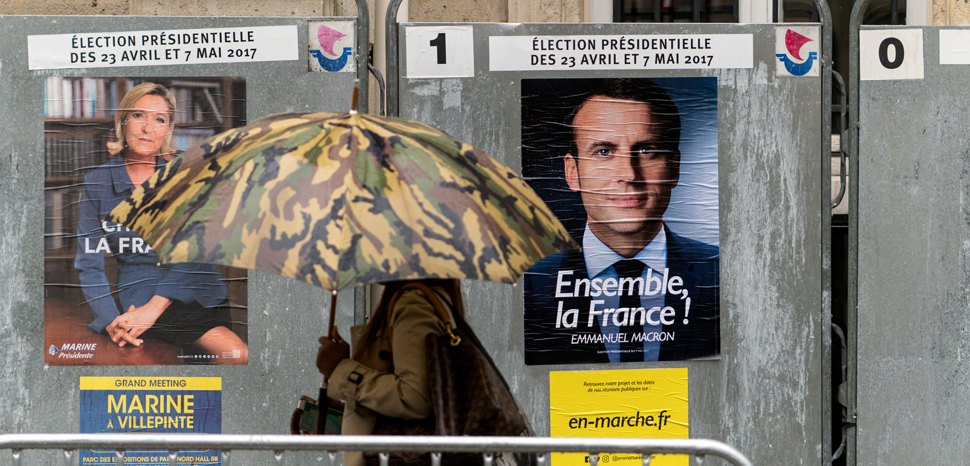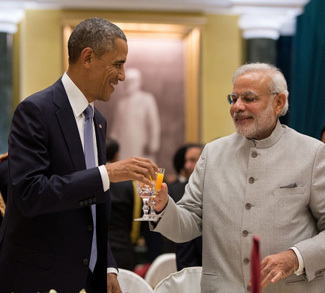“La France en colère” (France in anger). Over the past two years, this phrase has appeared on signboards, web sites, social media, and on the lips of politicians and the public at large. French incandescence stems from stagnant wages, income inequality that has been widening since 2000, insulated elites and an opaque bureaucracy that has created what could be described as the Great Payback.
The first round of France’s presidential election is a confirmation that the lid of a political and economic pressure cooker has come off. While it wasn’t immigration or political identity on the minds of the French voter, the results should send shockwaves through the political establishment, that far-right candidates out-polled the incumbent President Emmanuel Macron and have cast the Socialist and Gaullist parties, fixtures in French political culture into irrelevance. The hollowing out of traditional French political parties, which began in 2016, continues.
Macron has fallen dramatically. He swept into power at age 39, running against 11 candidates and handily beating his main rival, Marine Le Pen. His political party, La République En Marche has been described as a “democratic revolution,” winning 308 of 577 seats in parliamentary elections. However, that optimism for revolution is tempered by voter turnout, which in 2017 was the lowest in French history. Macron has joined a league of politicians who have tried to reform the French political and economic system and failed.
In 2017, Macron faced a deep Euro-skepticism, a distrust of the benefits of neo-liberal economics and the feeling that as a former Finance Ministry technocrat and investment banker with Rothschild & Cie Banque, he was a president for the rich. In this portrayal, Macron has faced a ‘yellow vest’ movement and then the COVID-19 pandemic, the former gaining traction as inequality in French society became undeniable and palpable.
Some of the past has relevance to Sunday’s first round of the French presidential election. Turnout and momentum could change the course of both French democracy and the direction of Europe. While Macron topped the first round with 28.5 percent of the vote compared to Le Pen’s 23.6 percent, the biggest shocks of the night were the very low scores of both Valérie Pécresse, the candidate of Les Républicains, and Socialist Party candidate and Mayor of Paris, Anne Hidalgo, who took only 2 percent of the vote. Also noteworthy was the performance of the Green Party (Europe Ecologie-Les Verts) at just 4.63 percent, as the environment was listed as being at the top of French voters’ concerns. As the yellow vest movement was fueled by Macron’s decision to increase the price of diesel, the lessons of the first round are clear: economic inequality is driving voter sentiment and an increasing number of French view the elite as out of touch.
Troubling now for Macron is that the initial poll after Sunday’s election shows the race too close to call at 51-49 percent in favor of Macron. France risks a backlash against the status quo political parties, as was the case of Donald Trump in the United States, Rodrigo Duterte in the Philippines, and Narendra Modi in India. French voters have shown little concern over Russia’s financing of Le Pen’s political party, or the fact that she visited Moscow prior to the 2017 election. Her five-point increase demonstrates that her past has not damaged her future.
Her future could be the undoing of the international order, according to the White House, who has worried that a Le Pen victory would unravel the NATO alliance. A Le Pen victory would be another domino to fall in a consequential series of elections, of which Putin-supporting Hungarian Prime Minister Viktor Orban won a fourth consecutive term on April 3. Again, French voters are not so much concerned with right or left, as Le Pen was nearly toppled by the leftist Jean-Luc Mélenchon, a famous NATO skeptic. He recently called NATO an “archaic” institution that should have been dissolved at the end of the Cold War. Anti-internationalist sentiment may run high in France.
In 1994, President Bill Clinton ironically said that “the American people deserve a government that honors their values and spends their money judiciously, and a country that rewards people who work hard and play by the rules.” While this concerned welfare reform, his era witnessed the hollowing out of the American economy, as free trade agreements dismantled principles of human rights and pushed China into the economic spotlight. Those who cautioned against globalism were derided and ridiculed.
It was ironic as Clinton was a beneficiary of an anti-NAFTA crusader, H. Ross Perot, whose share of the vote likely unseated President George H. W. Bush and launched Clinton’s presidency. The anti-globalists would strike again in 1996, and return in 2016. Macron and the West should brace themselves once again.
This new decade promises to be the era of anxiety rather than another age of reason. Post-COVID nervousness about economic recovery, the return of the Taliban in Afghanistan, and a horrific war in Ukraine are enough to either cripple electorates or motivate them. The proof is in Le Pen’s chances and the possible reelection of Donald Trump in 2024. Macron, if re-elected, will not be able to ease tensions as his reformist agenda, delayed by COVID-19, will once again be a fierce battleground. Others are in the same predicament. Boris Johnson’s approval ratings are at 30 percent and President Biden’s presidency has been called “cursed.”
The ability of the right-wing in France to first unite and tactically soften their message to attract and broaden their appeal is a lesson which cannot be ignored. Nationalism, both economic and political, has trumped globalism and the Right has always been better at wrapping themselves in the sacred and nostalgic shrouds of the past. Nostalgia is an exercise in selected memory, but it is difficult to name a country without a mythology. The center-left political parties in the United States and Great Britain narrowed their messages to appeal to urban elite professionals, abandoning traditional working class voters. Hillary Clinton’s “basket of deplorables” statement in which she categorized Trump supporters as “racist, sexist, homophobic, xenophobic, Islamophobic” was tactically suicidal.
In France, Le Pen’s strength was in parts of the country where jobs have been outsourced. The north, with a proud history of coal mining and the setting for Emile Zola’s best-selling epic novel Germinal, is a Le Pen stronghold. What is true in northern France replicates itself in West Virginia, the Rust Belt, as well as in Manchester or Liverpool.
Le Pen and, to a larger extent, Eric Zemmour have played anti-Muslim/migration cards. One cannot win a majority on this one point as right-wing populism has many complex drivers. In the words of one analyst, “migration need not be quantitatively remarkable to impact media and political discourse. ‘Imagined’ migration can be equally divisive.” The role of social media and disinformation in stoking fears cannot be underestimated. Unscrupulous politicians can create fears and build walls both real and imagined. What will France and Europe look like at the end of the decade if Le Pen wins?
In conclusion, win or lose, the ability of Marine Le Pen to be in a statistical tie for president of the French Republic and the inability of the Left and the traditional political parties to craft platforms to envision messages that win elections places the liberal order at risk and threatens to unravel a post-war system which was designed to temper the forces of extremism. France’s pivotal moment is also ours.
Paul D. Scott is a professor at the Catholic University of Lille, France. He is a China-Japan specialist who also works extensively on issues of conflict resolution, teaching in the graduate program at Jaume I University in Castelló, Spain.
Mark S. Cogan is an Associate Professor of Peace and Conflict Studies at Kansai Gaidai University based in Osaka, Japan and a former communications specialist with the United Nations.




